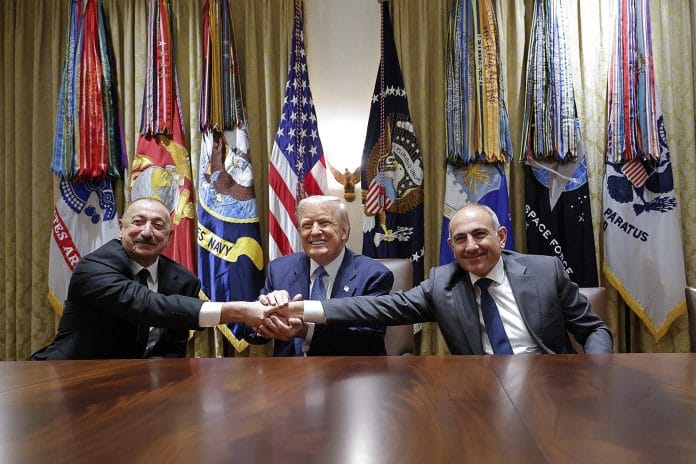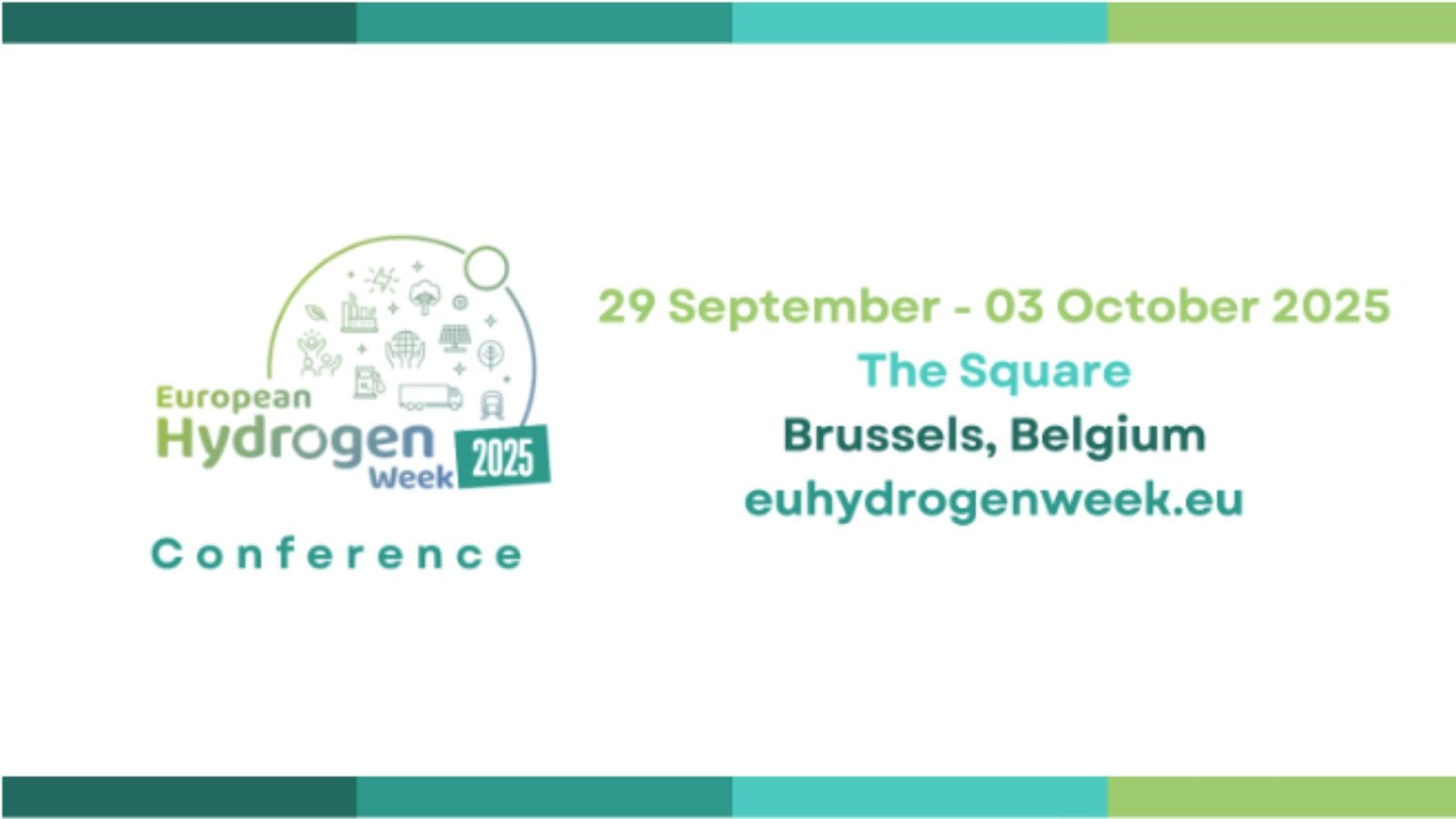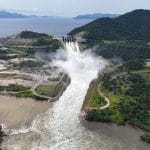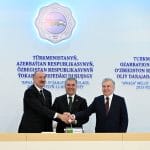Azerbaijan’s President Ilham Aliyev and Armenia’s Prime Minister Nikol Pashinyan, in the presence of U.S. President Donald Trump, signed a Joint Declaration on August 8 in the White House, marking a significant breakthrough to end decades of conflict.
The Joint Declaration is however, not exactly a final peace treaty. There remains substantial work on unresolved details before a final agreement can be signed, as well as amending Armenia’s constitution.
The U.S. Department of State said in a press release this agreement “is an opportunity for both countries to move forward and focus on unlocking the economic potential of the South Caucasus region, which will bring trade deals and prosperity for the American people and both Armenia and Azerbaijan.”
The announcement on August 8 came shortly before Trump announced that he had agreed to meet Russian President Vladimir Putin for talks in Alaska on August 15.
Although the U.S. President described the agreements signed by Azerbaijan and Yerevan at the White House on August 8 as “historic,” Baku and Yerevan had started direct bilateral contacts in December 2023 (COP28 in Dubai) moving closer to a final peace agreement in just two years of direct talks than they had in decades of negotiations with third-part interventions.
A key breakthrough came last month, when Pashinyan and Aliyev met in Abu Dhabi on July 10 shortly after their teams finalized the text of a peace accord.
“We are today establishing peace in the Caucasus,” Azerbaijan’s President said at the White House on August 8. “We lost a lot of years being preoccupied with wars and occupation and bloodshed.” The Armenian premier called the moment a “significant milestone” in relations between the two countries.
President Ilham Aliyev: “Today is a historic day, and also because we are bringing peace.” pic.twitter.com/1D8AThs9lm
— Ilham Aliyev (@presidentaz) August 9, 2025
European Union foreign policy chief Kaja Kallas said the agreements between Armenia and Azerbaijan mark a significant breakthrough to end decades of conflict. “We strongly commend both sides and the U.S. administration for using the momentum and making progress possible. It will now be important to ensure the timely implementation of the agreed steps, notably the signing and ratification of the peace treaty,” the European Council said in a statement.
The agreement represents an important and decisive next step towards full-fledged normalization of relations between Armenia and Azerbaijan, based on mutual recognition of each other’s sovereignty, territorial integrity and inviolability of borders in line with the 1991 Alma-Ata Declaration, the EU Council said, adding that once implemented, the steps agreed today are expected to have a positive impact on the overall peaceful development of the region, and to help bring societies divided by legacies of conflict closer to sustainable peace and shared prosperity.
“The EU fully supports the Armenia-Azerbaijan normalization process and has been working for years with both parties and our international partners to create the conditions for lasting peace. We continue to stand ready to work with partners towards full-fledged normalization, providing additional support and expertise, including for the practical implementation of next steps,” the statement read.
Elchin Amirbayov, Representative of the President of the Republic of Azerbaijan for Special Assignments, told NE Global on August 11 the signing of the Joint Declaration in Washington reaffirmed Azerbaijan’s peace agenda. “Provision therein regarding the initialing of the peace agreement between Azerbaijan and Armenia acknowledged that further actions are required to achieve the signing and ratification of the Agreement, i.e. to enable the signature of the Agreement, Baku expects that amendments will be made to the Constitution of Armenia in order to eliminate territorial claims against Azerbaijan which are still there,” Amirbayov argued.
Meanwhile, NATO welcomed progress towards peace between Armenia and Azerbaijan and thanked the U.S. President for his investments in peace. “This is a significant step forward for the normalization process and for regional security more broadly. NATO will continue to work with our partners Armenia and Azerbaijan,” NATO said in a post on X.
UN Secretary General António Guterres also welcomed the comprehensive “Joint Declaration” signed on August 8 by Aliyev and Pashinyan together with Trump as an important milestone in the normalization of relations between Armenia and Azerbaijan. “I applaud the commitment of President Aliyev and Prime Minister Pashinyan to sustained dialogue and confidence-building, and recognize the efforts of President Trump in facilitating progress. I reaffirm the strong support of the UN for all efforts to advance lasting peace in the South Caucasus,” Guterres wrote on X.
I welcome the comprehensive “Joint Declaration” signed on Friday by @presidentaz Ilham Aliyev & Prime Minister @NikolPashinyan together with @POTUS Donald Trump as an important milestone in the normalization of relations between Armenia & Azerbaijan.
I applaud the commitment of…
— António Guterres (@antonioguterres) August 9, 2025
Advancing regional connectivity and energy exports
The White House said that, as part of the deal, the U.S. will also help build a major transit corridor that will connect Azerbaijan and its autonomous Nakhchivan exclave, which are separated by Armenian territory. The U.S. would have exclusive development rights to the proposed “Trump Route for International Peace and Prosperity (TRIPP),” which Washington said would facilitate greater exports of energy and other resources.
Pashinyan said on X he appreciates this “wonderful opportunity” to advance cooperation between Armenia and the United States, “stronger regional connectivity that will serve interests of our great nations”.
Historic engagement w/President @realDonaldTrump as we unite our efforts as strategic partners for more peaceful & prosperous future. I appreciate this wonderful opportunity to advance 🇦🇲🇺🇸cooperation, stronger regional connectivity that will serve interests of our great nations. pic.twitter.com/285tgw5XFB
— Nikol Pashinyan (@NikolPashinyan) August 8, 2025
“While initialing of the peace treaty will pave the way to end the decades of conflict, opening of transport communications in the region, including TRIPP – Trump Road for Peace and Prosperity – will unlock strategic economic opportunities that will create long-term benefits,” Pashinyan said.
The TRIPP corridor, previously referred to as the Zangezur corridor, is expected to include a railway line which would allow for the movement of goods, and eventually people, operated by an American company. The new route can also provide Azerbaijan a direct route to its exclave of Nakhchivan and in turn to Turkey, a route much shorter than the current “Middle Corridor” route through Georgia, which has up to now received the bulk of world attention and funds for upgrades.
“The agreement secures Azerbaijan’s role at the heart of Europe- Asia connectivity. It opens the door to major logistics, infrastructure, and energy investments – a hopeful sign of the prosperity and cooperation this peace can unlock,” said Turkhan Ahmadov, Director of Communications and ESG, Azerbaijan Railways (ADY).
Amirbayov told NE Global another key provision in the Joint Declaration is the commitment to opening transportation and communication links between the two countries, in particular the necessity of ensuring an unimpeded connectivity between the main part of Azerbaijan and its Nakhchivan Autonomous Republic. And TRIPP is mentioned a special connectivity project by U.S. to ensure that to be implemented within Armenian territory: the “Trump Route for International Peace and Prosperity,” he said.
“Last but not least, the joint appeal to the OSCE Chairperson-in-Office regarding the closure of the Minsk Process and its related structures marks another important step towards eliminating one of the major obstacles to peace and normalization,” Amirbayov said.
Kazakhstan’s President Kassym-Jomart Tokayev, whose country is deeply invested in the long distance transportation of freight through the so-called “Middle Corridor,” said the peace agreement signed in Washington between Azerbaijan and Armenia is a historically important achievement. He noted that Kazakhstan has also contributed to the conclusion of such important agreements between Azerbaijan and Armenia, proposing Almaty as the venue for negotiations at the level of Foreign Affairs Ministers on the key remaining parameters of the peace treaty.
Meanwhile on August 7, Azerbaijan’s Economy Minister Mikayil Jabbarov and ExxonMobil Vice President John Ardill signed a Memorandum of Cooperation between Azerbaijan’s state oil and gas company SOCAR and U.S. major ExxonMobil in the presence of Aliyev and U.S. President’s Special Envoy Steve Witkoff.
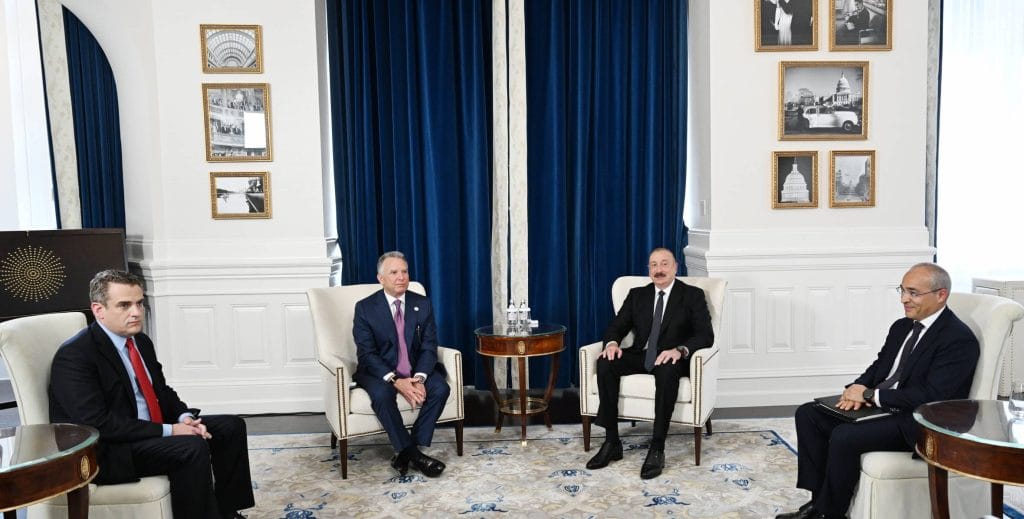
Azerbaijan’s President Ilham Aliyev, U.S. President’s Special Envoy Steve Witkoff, Azerbaijan’s Economy Minister Mikayil Jabbarov and ExxonMobil Vice President John Ardill meet at the White House, August 7, 2025. Photo: ILHAM ALIYEV on X
Following the signing ceremony, Aliyev and Witkoff held a meeting, noting that Aliyev’s working visit to Washington, at the invitation of Trump, provided a valuable opportunity to discuss the bilateral agenda and regional issues. The sides exchanged views on the prospects for strategic cooperation between Azerbaijan and the United States, the normalization process between Armenia and Azerbaijan, and the regional peace agenda.
Reactions from Russia and Iran
While Moscow said the meeting between Azerbaijani and Armenian leaders in the U.S. merits a positive assessment, “Involvement of extra-regional actors should contribute to strengthening the peace agenda rather than create difficulties,” Russian Ministry of Foreign Affairs spokesperson Maria Zakharova wrote on X.
In related news, Aliyev and Ukraine’s President Volodymyr Zelenskyy condemned on August 10 “Russia’s deliberate air strikes on a SOCAR oil depot in Ukraine, as well as on other Azerbaijani facilities, including a station that transports Azerbaijani gas to Ukraine, vowing it won’t halt Azerbaijan-Ukraine energy cooperation.”
Iran threatened on August 9 to block the proposed Caucasus agreement, Iranian media reported. It was not immediately clear how Iran, which borders the area, would block it but the statement from Ali Akbar Velayati, top adviser to Iran’s supreme leader, raised questions over its security, Reuters reported. He said military exercises carried out in northwest Iran demonstrated Tehran’s readiness and determination to prevent any geopolitical changes. Most likely the potential new Turkey-Azerbaijan corridor is seen as a threat by Tehran.
Documents published
The United States, with the Republic of Armenia and Republic of Azerbaijan, published the finalized documents from President Trump’s historic August 8 meeting with Azerbaijani President Aliyev and Armenian Prime Minister Pashinyan, a meeting that will usher in a new era of peace in the South Caucasus region. These documents include:

